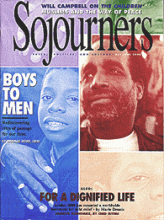Matchbox Child
Living in a matchbox
This city
This barrio
This shack
This life.
Cruel, ludicrous lack of space
Competing for limited everything
Survival of the toughest
Self-preservation a permanent posture
Imprisoning fear
Strangling hope
Why bother?
I am a match
Small, skinny, easily snapped in half
Snapped in half every day
Until I am so small
As not to be counted at all
Disposable.
From a poem by
Annette Mandeville,
Maryknoll Lay Missioner
in El Salvador.
Matchbox children staggering under the weight of $2 trillion in debt live daily the reality of "limited everything." With three billion other people in the world who live on less than $2 per day, they yearn for the basics essential to survival. With 1.5 billion others without access to potable water, they thirst for the possibility of a dignified life. One hundred and fifty million of these matchbox kids never get to school, yet they hunger incessantly for the knowledge that enables good workfor the possibility of nurturing the unique potential that each human life, including the most impoverished, contains.
How many hundreds of thousands of times has an Alice Walker or a Beethoven, a Martin Luther King Jr. or a Rigoberta Menchu flickered out in a matchbox of poverty and hopelessness? And how is this tragedy linked to the staggering foreign debt that cripples the economies of many impoverished countries?
This linkbetween debt and povertyis one of the most pressing moral issues for people of faith as we approach the new millennium. In the Hebrew scriptures (Leviticus 25:8-12), Jubilee is described as a set time when slaves are to be freed, land restored, and debts totally remitted. An increasingly insistent worldwide call is heard for a jubilee level of debt cancellation by the year 2000. Why is it so fervent?
Read the Full Article

